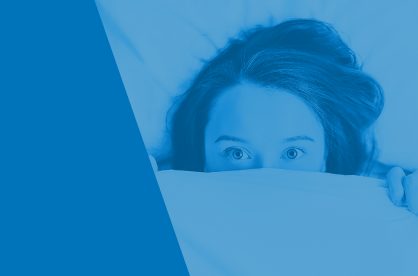
As humans we spend around a third of our lives asleep.
While that might seem like an incredible amount of time to be catching Z’s, sleep is fundamental to our health and well-being. It is a highly conserved behavior across the animal kingdom, going back millennia [1,2], and it is thought that deeper sleep led to enhanced cognitive abilities in early humans [3].
During sleep, many of the systems of the body (i.e., nervous, endocrine, skeletal, muscular, and immune) are in a state of anabolism ("building up"), which promotes restoration and healing. With that said, the most pronounced physiological changes during sleep occur in the brain, which further underlines the role of sleep in cognition, mood, and memory [4]. Therefore, any disruptions to the process of sleep, whether they be getting to sleep and/or remaining asleep, can have far-reaching consequences for overall health and wellness.
In hunter-gatherer populations, rates of insomnia are very low (around 2%), whereas in our modern industrialized Western societies, rates are between 10-30% [5]. The long-term consequences of sleep disruption are hypertension (high blood pressure), dyslipidemia (disordered fats in the blood), cardiovascular disease, weight problems, diabetes, and cancer [6,7]. Sleep should therefore receive as much attention as diet and exercise in the consideration of good health [8,9].
In this article, we will investigate the four main issues affecting sleep: getting to sleep, staying asleep, waking too early, and not feeling well-rested. Methods and strategies to address each issue will also be discussed.
Getting to Sleep
Difficulties in getting to sleep can be caused by the use of light-emitting devices (like our smartphones and laptops), especially those that emit blue-wavelength light [10], due to the suppression of melatonin, a natural hormone involved in the sleep-wake cycle [11] and synchronizing circadian rhythms [12]. Removing bright lights, noises, and technology from the bedroom can be a useful initial step in making it easier to get to sleep.
Prolonged sedentary behavior is associated with an elevated risk of insomnia and sleep disturbance based on a meta-analysis (pooled statistical model of all the evidence on a topic) [13]. Therefore, regular physical activity can be a great tool to improve sleep health [14]. This is especially true for middle-aged and elderly people, whereby exercise can enhance sleep duration and efficiency, irrespective of the mode and intensity of the exercise activity in question [15].
Having a sleep schedule can also be a great tool for building repetition and routine into your sleep habits and making it more likely that you will get to sleep thanks to calibrating your circadian clock.
Plus, remember Pavlov's dog? Ring a bell and salivate? You are just as programmable and a sleep routine before bed can leverage your programmability to fall asleep with ease.
And there's always Tro Calm to help quiet your mind before bed too!
Staying Asleep
There are many reasons why you may not be able to stay asleep. One of the well-known conditions is sleep apnea. This condition is characterized by repeated periods of upper airway obstruction during sleep that leads to reduced or absent airflow at the nose or mouth [16]. It is often accompanied by loud snoring, with each apnea (the cessation of breathing) interrupted briefly by micro-arousals – the person essentially wakes up to stop themselves from suffocating. Due to this, sleep architecture is fundamentally changed, which can lead to cardiometabolic and neuropsychiatric comorbidities.
Sleep apnea is treated using the gold-standard method of continuous positive airway pressure (CPAP), a machine that stabilizes the upper airway using pressure from a mask worn during sleep [17]. Surgery can also be performed to address structural problems arising in the upper airway that contribute to the overall issue.
Otherwise, the likelihood of staying asleep throughout the night can be enhanced by fostering a sleep-promoting environment in the bedroom by removing distractions, sources of noise, and so on.
Overall, the quality of sleep can be enhanced by improving health with exercise, optimizing nutritional habits [18,19], and limiting stress and anxiety as much as possible [18]. For example, rises in cortisol can wake you up early.
Waking Up Too Early
According to a 2014 study, middle of the night (or nocturnal) awakenings, without other insomnia symptoms, occurs in 3.5% of respondents [20]. These respondents reported significantly worse mental and physical health statuses compared with insomnia-free matched controls. Nocturnal awakenings are associated with various physical diseases and psychiatric disorders, especially when there is difficulty in getting back to sleep [21].
This type of insomnia can be treated using cognitive behavioral therapy, a recognized first line treatment for the condition [22], as well as meditation [23,24], various supplements, and lifestyle changes.
Not Feeling Well-Rested
Waking up groggy and having a feeling of impaired performance can be detrimental, especially for shift workers, those who are on-call such as doctors, or people that take naps during work hours. The technical name for this phenomenon is sleep inertia [25]. The key here is to address the other aspects that may be affecting sleep such as sustaining sleep, not waking up too early, and regulating your sleep schedule.
If you do wake up with sleep inertia, try bright light in your eyes or relatively loud noises (yes, like a pesky alarm clock).
Summary
Investing in your sleep will have a huge benefit to your overall health. As such, it is important to consider every aspect to truly optimize your sleep (i.e., getting to sleep, staying asleep, avoiding waking up to early, and feeling rested when you wake up). Identify the issue/issues and then tackle them head-on using behavioral changes like exercises, sunlight exposure, and sleep divorces (yes, there is such a thing as a sleep divorce and don't be shy about this!), make dietary changes (no late night snacks!), and try supplementation (like Tro Zzz)!
Are you ready to change out that old mattress now? If it's sagging or you can feel the springs, you are long overdue!
References
[1] A.C. Keene, E.R. Duboue, The origins and evolution of sleep, J Exp Biol. 221 (2018) jeb159533. https://doi.org/10.1242/jeb.159533.
[2] W.J. Joiner, Unraveling the Evolutionary Determinants of Sleep, Curr Biol. 26 (2016) R1073–R1087. https://doi.org/10.1016/j.cub.2016.08.068.
[3] D.R. Samson, C.L. Nunn, Sleep intensity and the evolution of human cognition, Evol Anthropol. 24 (2015) 225–237. https://doi.org/10.1002/evan.21464.
[4] D.W. Carley, S.S. Farabi, Physiology of Sleep, Diabetes Spectr. 29 (2016) 5–9. https://doi.org/10.2337/diaspect.29.1.5.
[5] J.M. Siegel, Sleep function: an evolutionary perspective, Lancet Neurol. 21 (2022) 937– 946. https://doi.org/10.1016/S1474-4422(22)00210-1.
[6] G. Medic, M. Wille, M.E. Hemels, Short- and long-term health consequences of sleep disruption, Nat Sci Sleep. 9 (2017) 151–161. https://doi.org/10.2147/NSS.S134864. [7] Institute of Medicine (US) Committee on Sleep Medicine and Research, Sleep Disorders and Sleep Deprivation: An Unmet Public Health Problem, National Academies Press (US), Washington (DC), 2006. http://www.ncbi.nlm.nih.gov/books/NBK19960/ (accessed June 2, 2023).
[8] J.-P. Chaput, C. Dutil, H. Sampasa-Kanyinga, Sleeping hours: what is the ideal number and how does age impact this?, Nat Sci Sleep. 10 (2018) 421–430. https://doi.org/10.2147/NSS.S163071.
[9] M.J. Sateia, International classification of sleep disorders-third edition: highlights and modifications, Chest. 146 (2014) 1387–1394. https://doi.org/10.1378/chest.14-0970.
[10] M.I. Silvani, R. Werder, C. Perret, The influence of blue light on sleep, performance and well-being in young adults: A systematic review, Front Physiol. 13 (2022) 943108. https://doi.org/10.3389/fphys.2022.943108.
[11] M. Emet, H. Ozcan, L. Ozel, M. Yayla, Z. Halici, A. Hacimuftuoglu, A Review of Melatonin, Its Receptors and Drugs, Eurasian J Med. 48 (2016) 135–141. https://doi.org/10.5152/eurasianjmed.2015.0267.
[12] A. Shechter, E.W. Kim, M.-P. St-Onge, A.J. Westwood, Blocking nocturnal blue light for insomnia: A randomized controlled trial, J Psychiatr Res. 96 (2018) 196–202. https://doi.org/10.1016/j.jpsychires.2017.10.015.
[13] Y. Yang, J.C. Shin, D. Li, R. An, Sedentary Behavior and Sleep Problems: a Systematic Review and Meta-Analysis, Int J Behav Med. 24 (2017) 481–492. https://doi.org/10.1007/s12529-016-9609-0.
[14] M. Banno, Y. Harada, M. Taniguchi, R. Tobita, H. Tsujimoto, Y. Tsujimoto, Y. Kataoka, A. Noda, Exercise can improve sleep quality: a systematic review and meta-analysis, PeerJ. 6 (2018) e5172. https://doi.org/10.7717/peerj.5172.
[15] B.A. Dolezal, E.V. Neufeld, D.M. Boland, J.L. Martin, C.B. Cooper, Interrelationship between Sleep and Exercise: A Systematic Review, Adv Prev Med. 2017 (2017) 1364387. https://doi.org/10.1155/2017/1364387.
[16] W.T. McNicholas, D. Pevernagie, Obstructive sleep apnea: transition from pathophysiology to an integrative disease model, J Sleep Res. 31 (2022) e13616. https://doi.org/10.1111/jsr.13616.
[17] P. Pavwoski, A.V. Shelgikar, Treatment options for obstructive sleep apnea, Neurol Clin Pract. 7 (2017) 77–85. https://doi.org/10.1212/CPJ.0000000000000320. [18] J.M. Schmickler, S. Blaschke, R. Robbins, F. Mess, Determinants of Sleep Quality: A Cross-Sectional Study in University Students, Int J Environ Res Public Health. 20 (2023) 2019. https://doi.org/10.3390/ijerph20032019.
[19] K. Wilson, M.-P. St-Onge, E. Tasali, Diet Composition and Objectively Assessed Sleep Quality: A Narrative Review, J Acad Nutr Diet. 122 (2022) 1182–1195. https://doi.org/10.1016/j.jand.2022.01.007.
[20] M. Moline, M. daCosta DiBonaventura, D. Shah, R. Ben-Joseph, Impact of middle-of the-night awakenings on health status, activity impairment, and costs, Nat Sci Sleep. 6 (2014) 101–111. https://doi.org/10.2147/NSS.S66696.
[21] M.M. Ohayon, Nocturnal awakenings and difficulty resuming sleep: their burden in the European general population, J Psychosom Res. 69 (2010) 565–571. https://doi.org/10.1016/j.jpsychores.2010.03.010.
[22] M.D. Mitchell, P. Gehrman, M. Perlis, C.A. Umscheid, Comparative effectiveness of cognitive behavioral therapy for insomnia: a systematic review, BMC Fam Pract. 13 (2012) 40. https://doi.org/10.1186/1471-2296-13-40.
[23] H. Gong, C.-X. Ni, Y.-Z. Liu, Y. Zhang, W.-J. Su, Y.-J. Lian, W. Peng, C.-L. Jiang, Mindfulness meditation for insomnia: A meta-analysis of randomized controlled trials, J Psychosom Res. 89 (2016) 1–6. https://doi.org/10.1016/j.jpsychores.2016.07.016.
[24] H.L. Rusch, M. Rosario, L.M. Levison, A. Olivera, W.S. Livingston, T. Wu, J.M. Gill, The effect of mindfulness meditation on sleep quality: a systematic review and meta analysis of randomized controlled trials, Ann N Y Acad Sci. 1445 (2019) 5–16. https://doi.org/10.1111/nyas.13996.
[25] C.J. Hilditch, A.W. McHill, Sleep inertia: current insights, Nat Sci Sleep. 11 (2019) 155– 165. https://doi.org/10.2147/NSS.S188911.
[26] C.J. Hilditch, J. Dorrian, S. Banks, Time to wake up: reactive countermeasures to sleep inertia, Ind Health. 54 (2016) 528–541. https://doi.org/10.2486/indhealth.2015-0236.





Comments (0)
There are no comments for this article. Be the first one to leave a message!